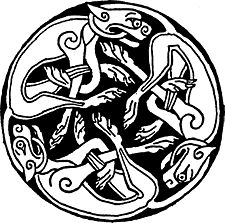- Beltane
-
Beltane
Beltane o Bealtaine (en irlandés Buenfuego) es un antiguo día festivo irlandés celebrado el 1 de mayo. Históricamente esta festividad se celebraba en Irlanda, Escocia y en la Isla de Man. En los otros países celtas como Gales, Galicia, Bretaña y Cornualles había festividades similares el mismo día. La festividad sobrevive con prácticas folclóricas en las naciones celtas y la diáspora y experimenta un grado de renacimiento en recientes décadas.
Para los celtas, Beltane marcaba el comienzo de la temporada de verano pastoral cuando las manadas de ganado se llevaban hacia los pastos de verano y a las tierras de pasto de las montañas. En irlandés moderno Mi na Bealtaine (Mes de Bealtaine) es el nombre del mes de mayo. A menudo se abrevia el nombre del mes como Bealtaine, conociendo al día festivo como Lá Bealtaine.
Una de las principales actividades de la festividad consistía en encender hogueras en las montañas y colinas con ritual y significado político.[1] [2] en Oidhche Bhealtaine (La víspera de Bealtaine). En gaélico escocés moderno, se usa sólo Lá Buidhe Bealtaine (El día amarillo de Bealltain) para describir el primer día de mayo.
En la antigua Irlanda la hoguera de Bealtaine principal se encendía en la colina central de Uisneach ‘El ombligo de Irlanda’ el centro de rituales del país, el cual se encuentra ahora situado en lo que es Westmeath. En Irlanda el prendimiento de hogueras en Oidhche Bhealtaine parece haber sobrevivido únicamente hasta el presente día en el Condado de Limerick, especial y mismamente en Limerick con su noche de hoguera anual, aunque algunos grupos culturales han expresado interés en revivir el hábito en Uisneach y quizás en la Colina de Tara.[3] En tiempos modernos también se puede observar la iluminación de fuegos comunitarios de beltane que se encienden individualmente en hogares en algunas partes de la diáspora celta y por algunos grupos neopaganos, aunque en la mayoría de estos casos esta practica es una celebración cultural más que el renacimiento de una antigua tradición.[4] [5] [1] [6]
Notas
- ↑ a b Danaher, Kevin (1972) The Year in Ireland: Irish Calendar Customs Dublin, Mercier. ISBN 1-85635-093-2 pp.86-127
- ↑ Chadwick, Nora (1970) The Celts London, Penguin. ISBN 0-14-021211-6 p. 181
- ↑ Aideen O'Leary reports ("An Irish Apocryphal Apostle: Muirchú's Portrayal of Saint Patrick" The Harvard Theological Review 89.3 [July 1996:287-301] p. 289) that, for didactic and dramatic purposes, the festival of Beltane, as presided over by Patrick's opponent King Lóegaire mac Néill, was moved to the eve of Easter and from Uisneach to Tara by Muirchú (late seventh century) in his Vita sancti Patricii; he describes the festival as in Temora, istorium Babylone "at Tara, their Babylon." There is no authentic connection of Tara with Babylon, nor with Beltane.
- ↑ MacKillop, James (1998) A Dictionary of Celtic Mythology. Oxford, Oxford University Press. ISBN 0-19-280120-1 pp.39, 400-402, 421
- ↑ Dames, Michael (1992) Mythic Ireland. London, Thames & Hudson ISBN 0-500-27872-5. p.206-10
- ↑ McNeill, F. Marian (1959) The Silver Bough, Vol. 2. William MacLellan, Glasgow ISBN 0-85335-162-7 p.56
Enlaces externos
Categorías: Fiestas de Irlanda | Festivales | Cultura de Irlanda | Cultura popular | Festividades wiccanas
Wikimedia foundation. 2010.

